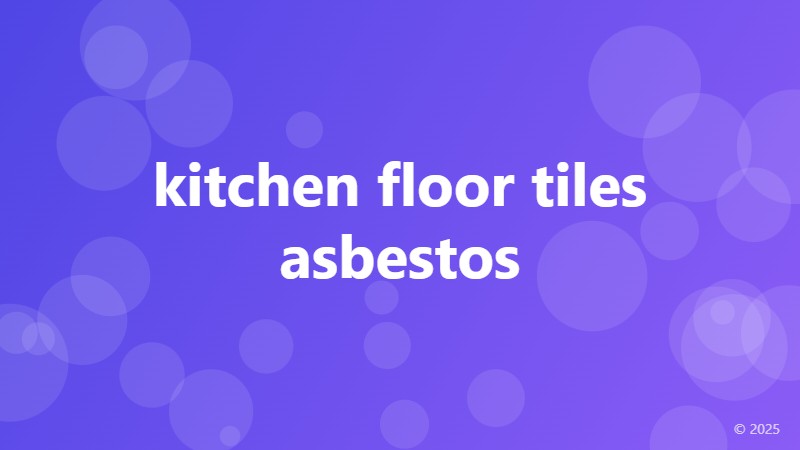kitchen floor tiles asbestos

Understanding the Risks of Kitchen Floor Tiles Containing Asbestos
Kitchen floor tiles are a staple in many homes, providing a durable and stylish surface for food preparation and cooking. However, some kitchen floor tiles may pose a hidden danger to homeowners and their families. If your kitchen floor tiles were installed before the 1980s, there is a possibility that they contain asbestos, a toxic substance linked to serious health problems.
The Dangers of Asbestos in Kitchen Floor Tiles
Asbestos is a group of naturally occurring minerals that were once commonly used in building materials, including kitchen floor tiles. While asbestos was prized for its durability and heat resistance, it has been proven to cause serious health issues, including lung cancer, mesothelioma, and asbestosis. When asbestos-containing kitchen floor tiles are damaged, disturbed, or worn down, they can release microscopic fibers into the air, which can be inhaled and cause harm.
Identifying Asbestos in Kitchen Floor Tiles
Identifying asbestos in kitchen floor tiles can be challenging, as it may not be immediately apparent. However, there are some signs that may indicate the presence of asbestos:
- Older tiles: If your kitchen floor tiles were installed before the 1980s, it is more likely that they contain asbestos.
- Damaged or worn tiles: If your kitchen floor tiles are cracked, chipped, or worn down, it may be a sign that they contain asbestos.
- Tiles with a textured or vinyl surface: Some kitchen floor tiles with a textured or vinyl surface may contain asbestos.
What to Do If You Suspect Asbestos in Your Kitchen Floor Tiles
If you suspect that your kitchen floor tiles contain asbestos, it is essential to take immediate action to minimize the risks. Here are some steps you can take:
- Avoid disturbing the tiles: Refrain from sweeping, vacuuming, or wet mopping the tiles, as this can release asbestos fibers into the air.
- Seal the tiles: Apply a sealant to the tiles to prevent further damage and reduce the risk of asbestos fibers being released.
- Hire a professional: If you need to repair or remove the tiles, hire a licensed asbestos abatement professional to ensure safe handling and disposal.
Safe Removal and Replacement of Asbestos-Containing Kitchen Floor Tiles
Removing asbestos-containing kitchen floor tiles requires specialized training, equipment, and safety precautions. If you need to replace your kitchen floor tiles, it is crucial to hire a licensed asbestos abatement professional who can:
- Contain the area: Seal off the area to prevent asbestos fibers from spreading to other parts of the home.
- Remove the tiles: Use specialized equipment and safety gear to carefully remove the tiles and dispose of them properly.
- Clean and decontaminate: Thoroughly clean and decontaminate the area to ensure it is safe for occupancy.
Remember, safety should always be the top priority when dealing with asbestos-containing kitchen floor tiles. By understanding the risks and taking the necessary precautions, you can protect yourself and your loved ones from the dangers of asbestos.